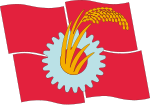 | |
| Type | Daily newspaper |
|---|---|
| Owner(s) | Japanese Communist Party |
| Editor-in-chief | Kogiso Yoji |
| Founded | 1928 |
| Language | Japanese |
| Headquarters | Tokyo |
| Country | Japan |
| Circulation | 850,000 [1] |
| Website | Akahata (in Japanese) Japan Press Weekly (in English) |

Shimbun Akahata (しんぶん赤旗, Shinbun Akahata, lit. Newspaper Red Flag) is the daily newspaper of the Japanese Communist Party (JCP) in the form of a national newspaper. It was founded in 1928 and currently has both daily and weekly editions.[2]
Akahata has journalists based in the capitals of ten countries around the globe. They are Beijing, Berlin, Cairo, Hanoi, London, Mexico City, Moscow, New Delhi, Paris, and Washington, D.C. Japan Press Weekly is the newspaper's English edition.
YouTube Encyclopedic
-
1/2Views:132 501952
-
Japan's Worst Political Corruption Scandal
-
DECEMBER 6 TO 10 , 2016 CURRENT AFFAIRS QUESTIONS FOR SSC CGL CHSL UPSC
Transcription
History
The newspaper was founded in 1928, six years after the establishment of the JCP. It was banned in Japan because it was viewed as subversive, forcing it to operate underground. The newspaper was legalized along with the JCP during the American occupation of Japan.[1]
Content
Some of their journalism deals with activist politics, but they also do original reporting on a wide variety of political issues which are often untouched in Japan. Most Japanese newspapers publish the names of alleged criminals, but Akahata often declines to publish their names, unless they are related to organized crime or right-wing activities. They also go out of their way to avoid using polite terms for the Emperor of Japan; for example, the paper refers to the Emperor's Cup exclusively as "a Japanese soccer tournament". They refer to the Buraku Liberation League as the "Liberation" League, using scare quotes to convey their opposition to the group.
Circulation over time
In 1959, Akahata had a daily circulation of around 40,000.[3] By the end of 1960, as a result of recruitment drives conducted in conjunction with the 1960 Anpo Protests, circulation soared to around 100,000.[3] By 1970, the newspaper had over 400,000 subscribers to its daily edition, and more than 1 million subscribers to its Sunday edition.[3] In the early 1990s, daily subscribers were over 3 million. However, by 2007, daily circulation had fallen to around 1.6 million, and fell further to around 1.0 million by 2019. As of 2024[update], it has a circulation of 850,000.[1]
See also
References
- ^ a b c "An obscure communist newspaper is shaping Japan's politics". The Economist. 18 April 2024. ISSN 0013-0613. Retrieved 2024-04-18.
- ^ "A Profile of the Japanese Communist Party". Japanese Communist Party. July 2016. Retrieved 8 August 2017.
- ^ a b c Kapur, Nick (2018). Japan at the Crossroads: Conflict and Compromise after Anpo. Cambridge, Massachusetts: Harvard University Press. p. 272. ISBN 9780674988484.
Further reading
- Beckmann, George M.; Okubo, Genji (1969). The Japanese Communist Party 1922-1945. Stanford University Press.
- De Lange, William (2023). A History of Japanese Journalism: State of Affairs and Affairs of State. Toyo Press. ISBN 978-94-92722-393.
- Tim, Rees; Thorpe, Andrew (1998). International Communism and the Communist International, 1919-43. Manchester University Press.
- Scalapino, Robert A. (1967). The Japanese Communist movement, 1920-1966. University of California Press.
External links
- Shimbun Akahata (in Japanese)
- Japan Press Weekly

